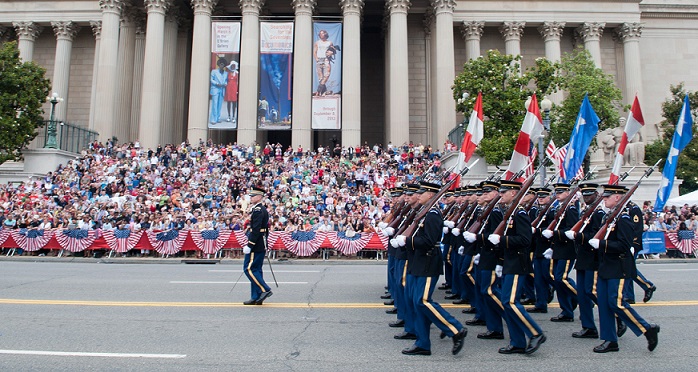Solemn Legion of the brave
Marching by there grave to grave,
Defending faith and family,
Fighting wars for our country.
Solemn Legion boots in time,
Drummers drumming, bagpipes whine,
Marking graves with flower baskets
Of the soldiers in their caskets.
Past immortals we remember
In the spring and cold November.
Legionnaires salute the flag
Rising over each dog tag.
We can do no less than stand,
Salute the flag and Legion band,
Honor those in fields of green,
Marching on with ghosts between.
Roy E. Peterson is a writer and former U.S. military army intelligence officer who currently resides in Texas.















A solemn and dignified tribute to the men who cared enough for liberty to die for it. Perfect for Memorial Day.
In line 2, the word “there” seems redundant to me.
Marching by where? Where is “there”?
For the word “there” to be in that line, the reader should be told where “there” is.
The line would sound a lot easier if “by there” was replaced with a simple adjective, for example:
“Marching stoutly, grave to grave”.
Monty, “stoutly” is an adverb, not an adjective. But, yes, where o where are here and there? The more specific, the better. Roy has done more in his life than we would have done with several lives. If he really wants to, I’m sure he will master the poetic line in short order.
I don’t even know what an adverb is, CB. I know verbs, nouns and adjectives; anything after that I have to look-up. What’s more, I didn’t even know the difference between verbs and nouns ‘til I was well into my 30’s! That’s how things are for one who didn’t receive an education. I’ve never known anything about the technicalities of words . . only words.
So, I won’t even bother looking-up the word ‘stoutly’: I’ll take your word for it, I know you won’t be wrong on such a thing.
And my apologies to you, Roy, for the mis-labelled suggestion.
Monty, it’s this simple: an adjective describes a noun or pronoun; an adverb modifies a verb or adjective. For a person who claims to be uneducated, your observations are very astute. Most commonly, any word ending in “-ly” is an adverb, as in, “the critics responded quickly.” There are many words that can be both adjectives and adverbs. In “He was fast,” “fast is a predicate adjective, but in “He ran fast,” “fast” is an adverb. I know that this isn’t clear enough, so I can only suggest that you get yourself a copy of Margaret Shertzer’s The Elements of Grammar or some similar reference book on the subject. I know most of this stuff cold, but I constantly refer back to the proven authorities. Formal English is fairly regular, but by no means is it simple. For now, I’ll spare you the arcane realm of the subjunctive mood. On such matters I always defer to Joseph Salemi, but for the time being, I’m all you’ve got.
Hooray: after 56 years in this life, I’ve learnt what an adverb is.
Very clearly explained, CB; I’m now in no doubt about the difference between an adjective and an adverb. By the time I’m 60, I might’ve also learnt the meaning of another speech-rule that I’ve always heard bandied about, but never took the trouble to look up . . a pronoun.
You say that “for the moment, you’re all I’ve got”: You may be all I ever need! When it comes to the rules/regulations/laws of words/poetry, etc, I doubt if there will ever be anything I suddenly need to know which you don’t already know.
Just to clarify: If we’re talking about school-education, I didn’t ‘claim’ to be uneducated . . I ‘am’ uneducated. A school-education may put Man in good stead for many different aspects of adult life; but in the aspect of having a true affinity with the written-word . . one can only be born with that. I’m living proof. But don’t listen to me, listen to Wilde: “It seems to me that education is an admirable thing; but it’s worth remembering from time to time that nothing worth knowing can be taught”.
Roy, you’ve already read the other comments, and I have one or two of my own. First of all, I can’t imagine having lived my life as you have done. My greatest risk is walking across the street. For your dedication to American ideals, I bow my head and admit that I’m only a shadow of what a true American should be. If my appreciation of your dedication means anything, then I hope I shall be forgiven my shortcomings.